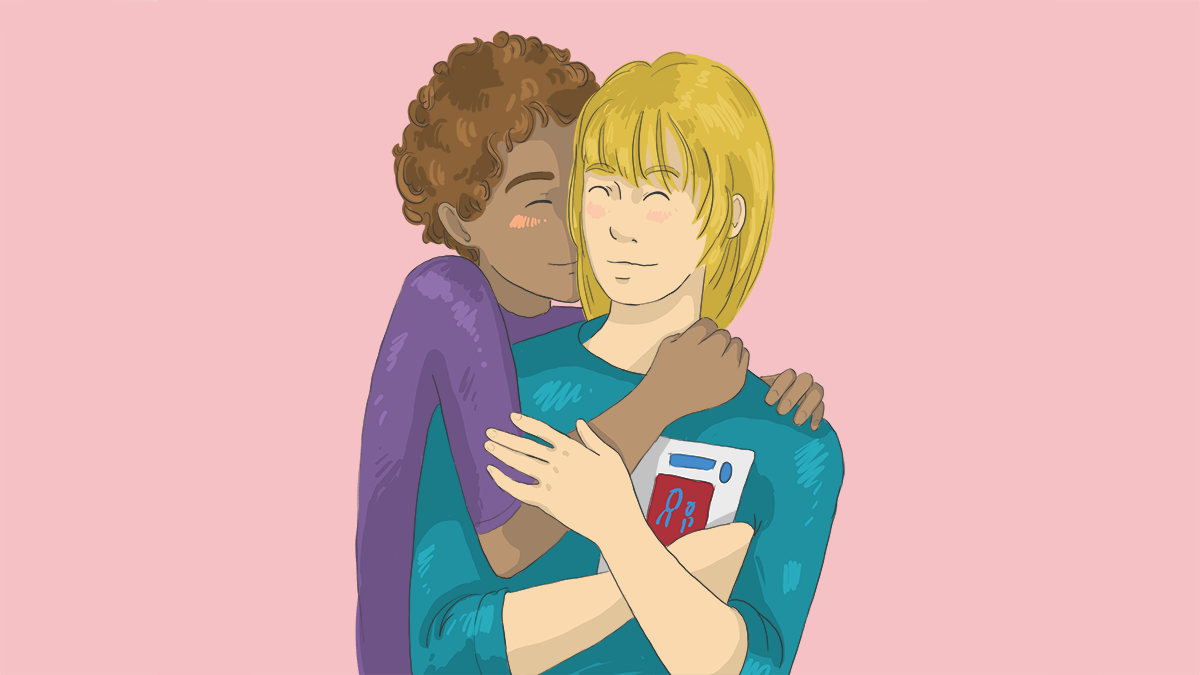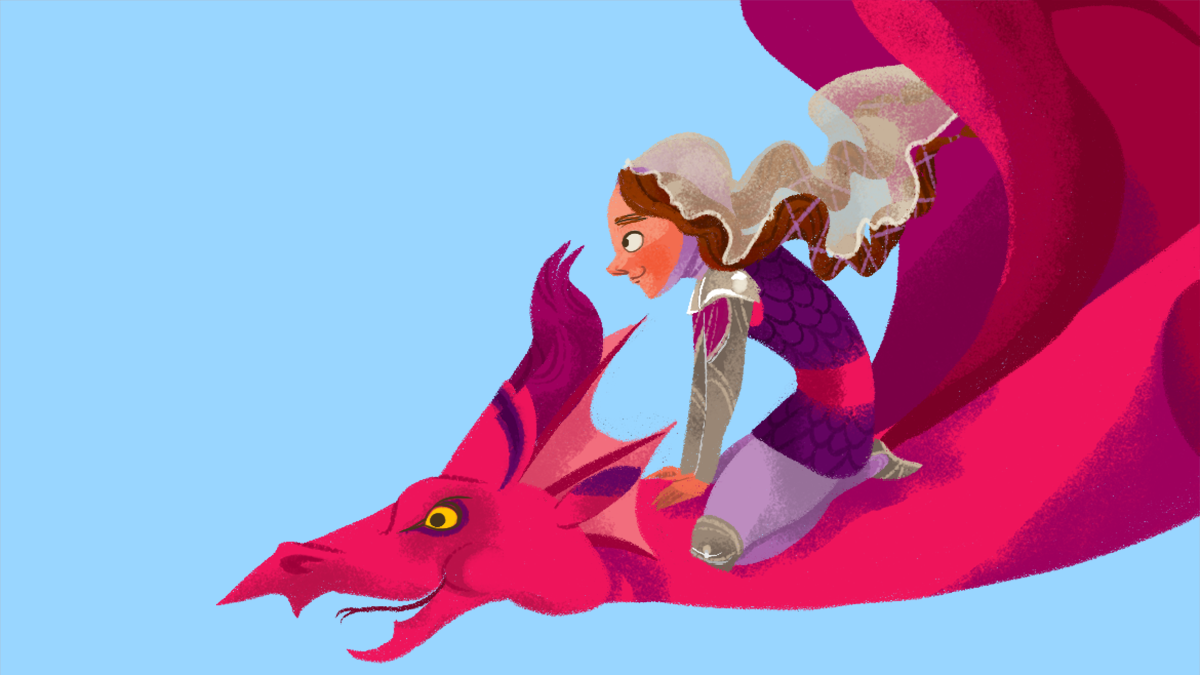Writing fan fiction: a beginner's guide
Fan fiction is a type of writing that responds to something else like a book, a TV show or a film.
People write fan fiction because they are big fans of their chosen story, and want to create more of it. They might imagine what happened before or after the story's main events or imagine other scenes in the lives of their favourite characters.
Fan fiction is a great way to get started with writing, because a lot of the work has been done for you. Characters, settings and plots are already there to be customised, changed and adapted. The possibilities are endless. Have fun!

All the fics
Fan fiction contains a wealth of different classifications of stories. You could kill off a character from an existing fandom and create a deathfic - their funeral, what happens after they die, and so on. Or you could write a silly, humorous version of the original and create a sillyfic! So where do you start? Here are some ideas to get you going...
Ideas to get you started
-
Create an original character
Original characters (OC or OMC - Original Male Character/OFC - Original Female Character) are new characters the fan fiction writer creates and inserts into an existing fandom universe. With original characters you get to imagine new spaceship crew members, invent long-lost family members for your favourite book characters, or create a new love interest for that supporting character that ends up alone at the end of the last story you read.
As with writing all characters in fiction, your OC should be as three-dimensional as possible and have real motivations and flaws (see our writing advice pages for more). Remember, a Mary Sue is an OC that is too perfect and powerful to be believed, and is something to be avoided in good fan fiction writing. Interesting characters are like real people: full of desires and weaknesses, hopefully with enough redeeming features to be interesting to the reader!
Ideas for creating an original character
- Write a story that features a protagonist from a fandom of your choice interacting with an OC from an early point in their life: parents, perhaps, or a favourite or hated teacher. The story - a prequel, maybe - is about how that person helped shape who the protagonist is now.
- Insert a new character into a fandom and see how that changes it. Does your OC create chaos or change the ending? Are they an alternative love interest for the main character? Do they hate the protagonist? Why?
- Imagine one of the characters from your chosen fandom has a secret twin. Do they know, and are they keeping it a secret? Why? Or maybe they don't know and the secret is revealed to them in some way. Is the twin spookily like them, the total opposite, or a kind of yin to their yang? How does the character having a twin change the story?
-
...Or an alternate universe!
An alternate universe (AU) in fan fiction is where you create a new world for characters of an existing fandom to have adventures in. So it might be that you take Katniss and Peeta and put them in present-day France, or you could move the cast of characters from Dracula and place the story in 1980s London.
Creating a fantasy alternate universe is also an option - a whole new made-up world of your own. This requires some world-building on your part as the writer.
World-building means creating a convincing universe for the reader, where there is enough description to enable them to visualise where the characters are, how the world functions and what it believes in - but not so much dumped on them all in one go that they get overwhelmed and stop reading. Lord of the Rings is a great example of building a world from scratch, but not being onerous to read.
Ideas for using an alternate universe in your story
- Take the two main characters from a fandom and put them in one of the following settings. How do they react to the new environment? What new challenges does it present?
- A remote, undiscovered part of the jungle
- Venus in the future
- The Wild West
- Revolutionary France, 1780-1800
- A planet hostile to human life
- Create a new setting for existing characters where the natural laws of that universe are different to the original story world. For instance, everyone can fly; all men are slaves; one half of the population are deaf, and so on.
- Take the two main characters from a fandom and put them in one of the following settings. How do they react to the new environment? What new challenges does it present?
-
Crossover fanfiction
Crossover fan fiction is when a writer combines elements from two or more books, TV shows or films in one new story. So, for instance, Gandalf and Death, the narrator in The Book Thief, get together and open a bakery; or Tris from Divergent and Todd Hewitt from the Chaos Walking trilogy fall in love. Other elements apart from characters can cross over too - think about locations, themes and plots.
Ideas for using crossover in your writing
- Take a location from one fandom and the basic plotline from another and create a new story with new characters.
- Take a character each from two different fandoms and combine them in the world of another story.
- Take the way that one of the stories is told - perhaps an epistolary story (a story written through a series of letters or other documents) like Dracula - and use it to rewrite another story from a different point of view. For instance, it could be from the perspective of a background character's diary entries.
Start writing
You've got your character, a fandom, and the power of your imagination... so now what? Here are five quick tips to help you get started!

Five top tips for writing fanfiction
-
1. Know the canon
In fan fiction, the original story, characters and world you are responding to is called the canon. For instance, the Harry Potter canon includes all the information and rules of the Harry Potter universe which is expressed in the series of novels and all other official offshoot publications and films.
Know the story you're responding to. Read it a few times and make sure you have the detail straight. Make your story make sense for the existing story world. If the protagonist can't swim in the original story, don't start yours with them doing the front crawl across the British Channel unless you can explain when and where they learnt the skill (and how it's relevant). If characters act out-of-character, or the world has changed in your version, make sure there's a good reason for it.
-
2. Have fun with plotbunnies
In fan fiction, a plotbunny is a rapidly developing idea for a story that won't leave you alone until you write it. Sound familiar? Great! The first stage of writing should be a kind of mad brainstorming.
Inspired by your chosen film, book, TV series or band, get all your plotbunny ideas down on paper or the screen, and then, when the bunnies have stopped gnawing at your brain, you can start to rewrite, hone and edit.
-
3. Look at our general writing guidance
The BookTrust teen writing page has great advice on constructing interesting and believable characters, plots, dialogue and ideas around diverse characters and situations. It features useful questions to ask of your writing, especially when you're in the editing and rewriting phase.
-
4. Don't write a Mary Sue
In fan fiction, the phrase Mary Sue refers to a new character who is unbelievably (and irritatingly) perfect. Does your character run faster, shoot higher and think faster than everyone else? Are they gifted with every paranormal gift available? Are they always right, desired by all and completely saintly with no flaws? If so, you might have written a Mary Sue.
Remember, the best characters are always flawed in some way, even if they have amazing powers. The flaws are what make them human, and readers will relate to them better that way. See our writing tips for more information on how to write great characters.
-
5. Get a beta reader
Fan fiction writers often work with other fans called beta readers, who read their work before they post it online and edit it or suggest changes or improvements. Reading your own work aloud to yourself or others is a good idea; alternatively, ask a friend to read it through for inconsistencies or points that need clarification. Doing either (or both!) of these will help make your writing the best it can be before you post it on a fan site.
Fan fiction glossary
Not sure what squick means or whether you're writing drabble? Find out with our handy list of fan fiction terms.

Beta reader: A fellow fan fiction fan who reads your story and makes suggestions for improvement before it is submitted or posted online.
Canon: The original story and its accepted 'official' features (such as characters and plot).
Cosplayers: Fans that make and wear their own costumes based on a story's characters.
Drabble: A fan fiction that is usually 100 words or less.
Fandom: The community that surrounds a TV show, film or book. Fan fiction writers, artists, poets, and cosplayers (fans that make and wear their own costumes based on a story's characters) can all be members of a fandom.
Ficlet: A fan fiction story approximately 100 words or less.
Mary Sue: A poorly developed character, too perfect and lacking in realism to be interesting
Plotbunny: A rapidly developing idea for a story that won't leave you alone until you write it.
Schmoop/Fluff: A romantic, 'fluffy' fan fiction story.
Slash: Fan fiction that features existing (usually heterosexual, or 'Het' ) canon characters in homosexual relationships. Lesbian relationships or encounters can sometimes be termed Femmeslash, to differentiate.
Squick: A cross between 'squeamish' and 'ick' - an awareness that there may be aspects of a fan fiction story that some readers may dislike, such as a character dying, sexual content or violent scenes.
Useful links
Ready to find out more about fan fiction? These websites are a great place to start...
Archive of Our Own
Also known as AO3, a well-known fan fiction site hosting over 6 million works in over 36,700 fandoms, featuring user-created stories on everything from books, to television, to games, to film.
Movellas
Fan fiction site that features fan fiction and other user-generated new writing. You can find fan fiction based on YA bestsellers such as the Divergent series, The Hunger Games and The Fault in Our Stars as well as about bands like One Direction.
Wattpad
Wattpad is one of the largest book communities on the web, and one of the largest sources of free reads. The site features almost three million fan fiction stories, often focusing on celebrities and comics.
FanFiction
FanFiction is considered to be world's largest fan fiction archive. It has over two million users, and hosts stories in over 30 languages. It features fan fiction for more or less every TV show, film, cartoon and game imaginable.
Rockfic
Rockfic features a particular type of fan fiction, Bandfic, based on bands.
AsianFanFics
With over 400,000 users, this large site features fan fiction with Asian characters and topics that revolve around Asian culture.
BookTrust HomeTime
Looking for something fun as a family? Enjoy storytime with our free online books and videos, play games, win prizes, test your knowledge in our book-themed quizzes, or even learn how to draw some of your favourite characters.
You might also like
Writing fiction
Everything you need to know about creating great characters, crafting a plot, including diversity and how to write realistic dialogue.
Authors' tips for getting started
Looking for advice from the experts? Top authors offer their top tips on getting started with writing.
Next steps
So you've written something you're happy with - but what now? Get advice on publishing and agents here.




